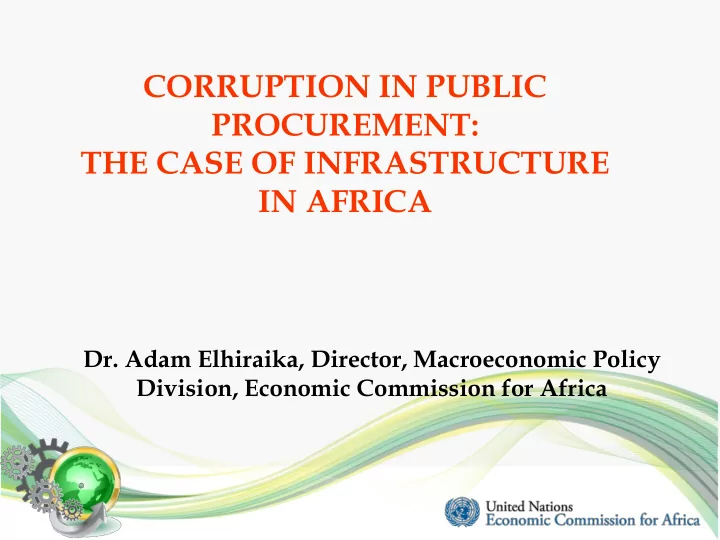

CORRUPTION IN PUBLIC PROCUREMENT: THE CASE OF INFRASTRUCTURE IN AFRICA Dr. Adam Elhiraika, Director, Macroeconomic Policy Division, Economic Commission for Africa
Outline Introduction Why focus on procurement in infrastructure sector Impact of Corruption in infrastructure procurement in Africa A review of Public Procurement Reforms in Africa Conclusion and areas for reform
Why focus on procurement in infrastructure sector Infrastructure development - transport, energy and ICT - is key to Africa’s structural transformation agenda (Agenda 2063/2030). Critical to attaining SDGs: Goal 9 calls for developing quality, sustainable & resilient infrastructure. Africa’s infrastructure gap is enormous.
Why focus on procurement in infrastructure sector (contd.) Infrastructure development & public procurement cannot be separated. An efficient public procurement system determines the quality of infrastructure. Public procurement is a means of organizing spending of public resources and accounts for a high proportion of total government expenditure. A transparent and efficient procurement system will aid in generating savings that can be reinvested for development.
Overview of Public Procurement Reforms in Africa 1980S-1995: Public Financial Management Reforms driven by IFIs included reforming public procurement systems. New Public Management introduced outsourcing to private companies 1998: 1 st African Public Procurement Conference in Abidjan (the need for common frameworks to improve accountability and transparency in procurement) 2000s: Enactment of Procurement laws and regulations and establishment of national procurement agencies (Tanzania - 2004, Tunisia 2002. Ghana – 2003)
Overview of Public Procurement Reforms in Africa: Country perspective Ghana Pre-reform challenges: incoherent; irregularities; political interference Mid-1990s: PFM reforms included procurement. 1999: Public procurement oversight group created. 2003: Public Procurement Act passed. Creation of new institutions. New procurement processes .
Impact of Corruption in Public Procurement • Despite series of reforms, Bad corruption still affects Africa’s Governance procurement systems owing mainly to bad governance. Lack of transparency • Petty corruption is prevalent. Weak accountability • But grand corruption is more important in terms of scale and Lack of impact. integrity
Impact of Corruption in Public Procurement (contd.) • Misallocation of resources to projects that are unnecessary and not economical. • Poor & low quality infrastructure • Increased public spending and lost public revenue and income.1 • Reduced competitiveness of countries2.
Country Examples . Kenya $ 5.2 billion Standard Gauge Railway Project: Corruption in tendering involved highly overpriced construction costs relative to international standards while legal procedures for bidding were not followed. (2014) Zambia Kafue Gorge Lower Power Station worth US$1.46 billion: Government to pay US $350 million more due to irregularities in tender process (2015) Tanzania Construction of Kigoma-Ujiji roads. The projects were to be completed within one to three years but only 6.5% of the total contract cost was included in the 2010/11 annual budget and only 7.8% had been paid as mobilization advances by June 2011 South SA Competition Commission pronounced penalties worth R1.5- billion on 15 construction firms for tender-rigging and collusion for Africa projects done between 2006 and 2010.
Why the Infrastructure Sector in Africa remains vulnerable to corruption Involves large sums of public resources, big and complex projects, direct control by government, multiple players & contractual links, sector fragmentation, deep seated culture of secrecy. (Stansbury, N. 2005) Technical capacity gaps compounded by the multiplicity of processes and procedures create avenues for abuse. Political interference is more prominent in infrastructure- related contracts given the large sums of money involved Weaknesses in accountability and transparency mechanisms
How corruption happens in infrastructure procurement? . Source : Transparency International 2005
Best practices in public procurement to address corruption There is no “one -size-fits- all” approach Decentralized procurement (Rwanda) Value For Money approach Merit-based E-procurement (In Ghana tender awards soared from 312 in 2007/08 to 2,823 in 2009/10 due to IT use) Out-sourcing (Ethiopia) Competitive bidding
Conclusion & Areas for Reform Reforms need to be contextualized according to country needs Adopt best practices that are cost effective & sustainable (Value-for-Money and green procurement) Improve and strengthen enforcement mechanisms Ensuring transparency in procurement & multi- stakeholder participation. Revise regulatory frameworks to address emerging and sophisticated forms of abuse arising from complex project cycles. Promote anti-corruption platforms at sub-regional and continental levels. Capacity building, targeting highly technical and specialized projects Address the huge gap on public procurement data
Thank you for your attention http://www.uneca.org/ http://www.uneca.org/publications/
Recommend
More recommend